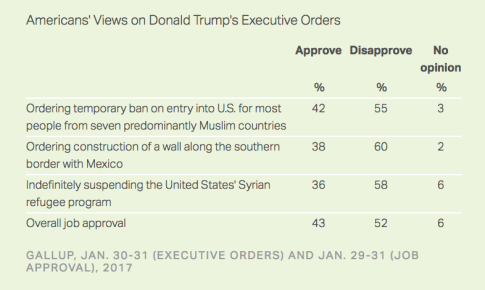| Date | Pollster | Question | Response options | Pro-ban (%) | Anti-ban (%) |
| Jan. 30-31 | PPP | Do you support or oppose Donald Trump’s executive order banning refugees and citizens of certain countries from entering the United States? | Support-Oppose | 47 | 49 |
| Jan. 31-Feb. 1 | YouGov | President Trump recently signed an executive order banning travel for people from seven Muslim-majority countries – Iran, Iraq, Syria, Sudan, Libya, Yemen and Somalia – for 90 days, and suspending the admission of refugees for 120 days. Do you approve or disapprove of this ban? | Approve-Disapprove-Not sure | 48 | 44 |
| Jan. 30-31 | Ipsos | Do you agree or disagree with the Executive Order that President Trump signed blocking refugees and banning people from seven Muslim majority countries from entering the U.S.? | Agree-Disagree-Don’t know | 49 | 41 |
Issue polling is a dicey business, for a few reasons.
For one, policies by definition deliver some kind of public “good” to some constituency, at least superficially. Focus on that, and you can probably get a positive response. At the same time, there are always trade-offs, and it can be very difficult, if not impossible, to capture those trade-offs in a meaningful way (and sometimes pollsters don’t even try). And because most voters don’t care about The Good Or Maybe Bad Policy nearly as much as you do, they’re going to defer to you on the pros and cons. Second, there’s an important distinction between testing a policy as a political win for a party or politician and testing it as a piece of independent political communication that is often lost. Testing one side of that divide or the other – or some combination – is appropriate in different contexts, but they illustrate very different things.
For some of these reasons, I was worried about polling on the #MuslimBan, which involves components that have polled well before, but is already pretty clearly tied to a popularity-challenged president. Anyway, it looks like I was wrong!
Polling on the policy is, so far, pretty consistent, despite some variation in question and response options. The public is fairly evenly divided, with supporters slightly outnumbering opponents in two out of three polls and the third essentially evenly split. All of the polls mention Donald Trump by name, which I think is correct, because abstracting Trump out of this is beside the point. There is a possibility that omitting detail about the countries involved is responsible for wider opposition in PPP’s case, but that could have other explanations, up to and including regular sampling error. At this stage it’s not an especially popular policy or an especially unpopular one (all the more reason to focus on the fact that it’s an immoral and ineffective one).
Update:
Below is a just-published Gallup poll, which paints a much more negative picture of public opinion and the ban. It’s not obvious to me what’s going on here, but it does introduce the possibility of a modal effect – perhaps people are eager to tell phone interviewers they dislike the ban, but more non-committal when being polled online. As noted yesterday, Gallup has also been more negative for Trump on regular job approval.

“Do you approve of Donald Trump’s order doing X” and “do you approve of Donald Trump ordering X” are different; the first makes it more about the order, the second makes it more about Trump.
Another distinction is that the verb “ordering” has a vaguely authoritarian sound to it, whereas the noun “Executive Order” is just a well-known official/lawyerspeak term.
LikeLike
Also, the two polls that show approval say “President Trump,” while the ones that show disapproval say “Donald Trump.”
LikeLike
The Gallup poll asks about three executive orders in succession, a subconscious trigger for the small-c conservative instinct to disfavor rapid change. It’s noteworthy that the approval percentage drops for each order. I bet if they’d kept asking with a few “control” orders (Keystone Pipeline, regulations, hiring freeze) you would continue to see the same drop.
LikeLike
[…] More on the challenges of issue polling – Will Jordan: “Issue polling is a dicey business, for a few reasons. For one, policies by definition deliver some kind of public ‘good’ to some constituency, at least superficially. Focus on that, and you can probably get a positive response. At the same time, there are always trade-offs, and it can be very difficult, if not impossible, to capture those trade-offs in a meaningful way (and sometimes pollsters don’t even try). And because most voters don’t care about The Good Or Maybe Bad Policy nearly as much as you do, they’re going to defer to you on the pros and cons. Second, there’s an important distinction between testing a policy as a political win for a party or politician and testing it as a piece of independent political communication that is often lost. Testing one side of that divide or the other – or some combination – is appropriate in different contexts, but they illustrate very different things.” [Borderline] […]
LikeLike
[…] But it’s still difficult to measure how many Americans support the policy. It’s hard to distill complex policy into a short poll question, so different pollsters wound up using different wording. […]
LikeLike
[…] challenges. But it’s still difficult to measure how many Americans support the policy. It’s hard to distill complex policy into a short poll question, so different pollsters wound up using different wording. […]
LikeLike